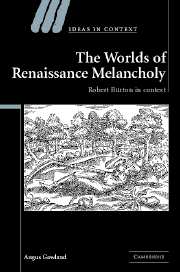Book contents
4 - The melancholy body politic
Published online by Cambridge University Press: 13 January 2010
Summary
The Anatomy was presented as a serious scholarly work for posterity, but its account of religious melancholy demonstrates the extent to which Burton tailored its contents to fit contemporary concerns. The final Section responded to the religious problems of the early Stuart polity in ways that, as we have seen, were largely supportive, in places perhaps coincidentally, of the Jacobean and Caroline regimes. Yet much of the rest of the Anatomy communicated anxiety and resentment, not just through the intellectually pessimistic atmosphere created by periodic bouts of scepticism, but directly through passages expressing discontentment with prominent aspects of the author's environment. When we turn from Burton's analysis of pathological spirituality to his discussion of pathological politics, we discover a vision that was unequivocally negative with respect to the role of contemporary governance in determining the condition of his commonwealth. My final two chapters are accordingly concerned with the political dimension of Burton's philosophia practica, as it was expressed in his critique of seventeenth-century England.
Humanist perceptions of English political affairs in the later decades of the sixteenth century and the early decades of the seventeenth were rooted in longstanding concerns about the virtue of the monarch and the court, the necessity of counsel to good governance, and the maintenance of a stable constitution. However, they were also becoming increasingly coloured by the recognition of new pressures coming to bear on rulers and subjects in an era of escalating religious and political uncertainty.
- Type
- Chapter
- Information
- The Worlds of Renaissance MelancholyRobert Burton in Context, pp. 205 - 245Publisher: Cambridge University PressPrint publication year: 2006

